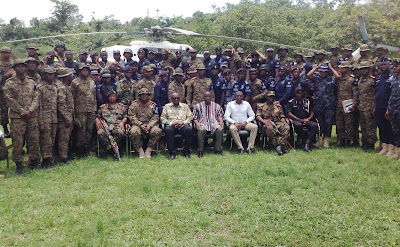GALAMSEY
LAND RECLAMATION PROJECT: DON’T IGNORE GHANAIAN MEDIA
By Mawutodzi Kodzo Abissath
 |
| A sample of land reclamation project |
A traditional wisdom is
reflected in this African proverb: If two people set a trap, it is the two that
inspect the trap.
Philosophically, the
significance of the above proverb is what can be interpreted as ‘transparency,
probity and accountability’. Even though there may be no written documentary evidence
to show who, what, when, how and why this particular proverb was coined, it can
be deduced that African ancestors detested corruption.
In this article, I
intend to make some observations about the efforts being made by government
since January 2017 to eliminate illegal mining in the country. I will place premium on the role the Ghanaian
media played thus far, and for which reason government should always carry the
media along as partners in the fight against galamsey.
The point must be made
that all governments since the 1992 Republican Constitution have made efforts
to fight galamsey or illegal mining in one way or the other. For example, in
May 2013, Ex-President John Dramani Mahama inaugurated a high-powered
inter-ministerial committee, dubbed Anti-Galamsey Task force to find permanent
solution to galamsey once and for all.
Disappointingly,
however, that task force could not live up to national expectation. It appeared
the Mahama government could not muster courage to provide the needed political
oxygen for the anti-galamsey task force under his command to combat the
galamsey menace. As we say, the rest is history.
Enter Nana Addo Dankwa
Akufo-Addo government 2017. Apart from a
personal commitment demonstrated by President Akufo-Addo to take the bull by
the horn in combating galamsey, the Ghanaian media made things a bit easier for Akufo-Addo
than Mahama. For example, the official launch of Media Coalition against Galamsey
spearheaded by the Graphic Communications Group Limited on April 4, 2017 was
exceptional. Mahama administration never enjoyed such massive media support.
Nevertheless,
Akufo-Addo’s personal commitment towards the elimination of galamsey was beyond
compare. For instance, on July 10, 2017, the President addressed traditional
authorities at a galamsey forum here in Accra and made an unthinkable
declaration that stunned the political world: “I put my presidency on line for the fight
against galamsey.” In other words Akufo-Addo was prepared to lose elections
rather than allow galamsey operators to destroy the national heritage
bequeathed to us by our ancestors, as he put it. That declaration was heroic indeed! And he
told the Nananom in the face that, as custodians of lands in Ghana, they could
not stand and stare while galamsey operators were destroying lands and
polluting rivers with impunity.
Even before the media coalition campaign
against galamsey took off, the Minister for Lands and Natural Resources, Mr
John-Peter Amewu on behalf of government, did a yeoman’s job by single-handedly
junketing some galamsey-ravaged regions where he made life uncomfortable to
some illegal miners. In fact, his unilateral embargo on galamsey operations and
withdrawal of all bulldozers and other galamsey equipment from rivers and water
bodies was action that dealt a deadly blow to some recalcitrant illegal miners.
He merits some commendation.
On Monday, July 31,
2017 government launched the now famous “Operation Vanguard”. The Operation Vanguard
was made up of 400 contingent of armed soldiers and police officers to combat
galamsey. The setting up of the Operation Vanguard was
seen as the apogee of Akufo-Addo government’s tenacity to terminate galamsey
once and for all. It is pragmatic and commendable.
Since the Operation
Vanguard came into force approximately five months now, some appreciable
successes have been achieved. Of course, there were challenges here and there.
At least one typical achievement one can cite for the purpose of this article
is the transformation of most muddy and polluted rivers that could not be
treated by the Ghana Water company before. Again, most farmlands and forest
that were devastated are gradually being reclaimed and replanted with trees.
Galamsey
Reclamation Fund
On Monday, November 13,
2017, media reports had it that the government had launched what was dubbed as
‘Galamsey Reclamation Project’. According to a Daily Graphic news story,(see page 29 of that day’s edition), the
Minister for Lands and Natural Resources, Mr John-Peter Amewu, launched the
galamsey reclamation project at Kyebi in the East Akim Municipality of the
Eastern Region.
It was explained that the
project would involve clearing excavated materials back into pits that had been
dug by the illegal miners to be followed by the planting of trees to restore
the destroyed vegetation. The Lands Minister was reported to have hinted that
government would constitute a committee of key stakeholders to oversee the
execution of the project.
Mr Amewu was reported
to have disclosed that it was estimated that about four per cent of the
country’s land size, totaling about 238,000 kilometer square (km2) have been
destroyed by illegal miners. It was revealed that Kyebi and its surroundings
alone “play host” to 18 of such illegal mining sites.
Experts in land
reclamation projects estimated that for every hectare of land destroyed by
galamsey operators, our beloved country will have to cough at least 60,000
Ghana cedis to reclaim it. In fact, the Land Minister lamented that the extent
of damage caused to the land, what the country requires in total to put the
vegetation back to normalcy is far in excess of the nation’s Gross Domestic Product
(GDP).
Government should
ensure that this galamsey “nonsense|” is eliminated once and for all. And in
view of the tremendous role the media played in the fight against galamsey,
whosoever stakeholders government may
want to engage for fund raising funds
activities for the Galamsey Reclamation
Project, the Ghanaian media must not be ignored.
The author works with
Information Services Department (ISD) abissath@gmail.com





